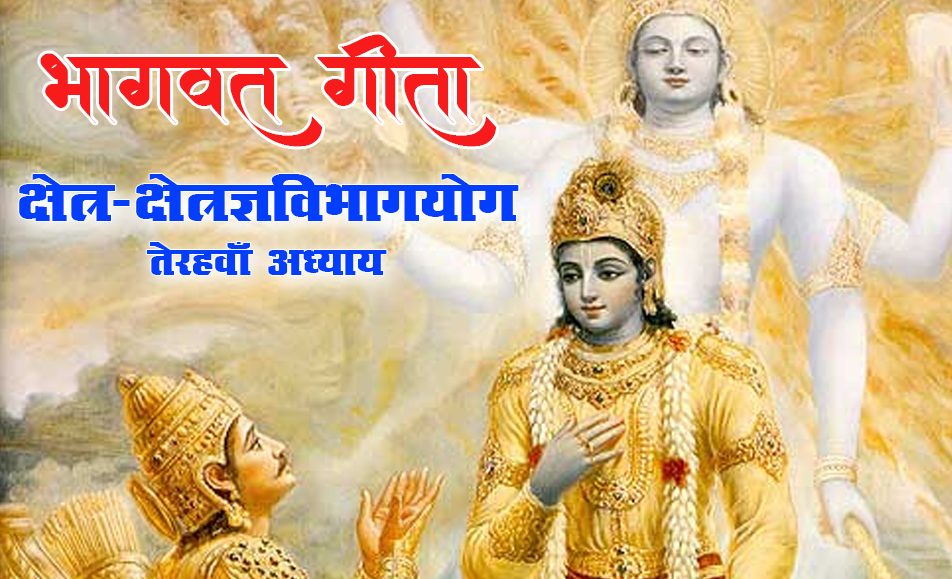(ज्ञानसहित प्रकृति-पुरुष का विषय)
ॐ तत्सदिति श्रीमद्भगवद्गीतासूपनिषत्सु ब्रह्मविद्यायांयोगशास्त्रे
श्रीकृष्णार्जुनसंवादे क्षेत्रक्षेत्रज्ञविभागयोगो नाम त्रयोदशोऽध्यायः॥13॥
Chapter 13 – The Bhagawad Gita
(ज्ञानसहित क्षेत्र-क्षेत्रज्ञ का विषय)
The Supreme Divine Lord said: O Arjun, this body is termed as kṣhetra (the field of activities), and the one who knows this body is called kṣhetrajña (the knower of the field) by the sages who discern the truth about both.
O scion of Bharat, I am also the knower of all the individual fields of activity. The understanding of the body as the field of activities, and the soul and God as the knowers of the field, this I hold to be true knowledge.
Listen and I will explain to you what that field is and what its nature is. I will also explain how change takes place within it, from what it was created, who the knower of the field of activities is, and what his powers are.
Great sages have sung the truth about the field and the knower of the field in manifold ways. It has been stated in various Vedic hymns, and especially revealed in the Brahma Sūtra, with sound logic and conclusive evidence.
The field of activities is composed of the five great elements, the ego, the intellect, the unmanifest primordial matter, the eleven senses (five knowledge senses, five working senses, and mind), and the five objects of the senses.
Desire and aversion, happiness and misery, the body, consciousness, and the will—all these comprise the field and its modifications.
Humbleness; freedom from hypocrisy; non-violence; forgiveness; simplicity; service of the Guru; cleanliness of body and mind; steadfastness; and self-control; dispassion toward the objects of the senses; absence of egotism; keeping in mind the evils of birth, disease, old age, and death; non-attachment; absence of clinging to spouse, children, home, and so on; even-mindedness amidst desired and undesired events in life; constant and exclusive devotion toward Me; an inclination for solitary places and an aversion for mundane society; constancy in spiritual knowledge; and philosophical pursuit of the Absolute Truth—all these I declare to be knowledge, and what is contrary to it, I call ignorance.
Humbleness; freedom from hypocrisy; non-violence; forgiveness; simplicity; service of the Guru; cleanliness of body and mind; steadfastness; and self-control; dispassion toward the objects of the senses; absence of egotism; keeping in mind the evils of birth, disease, old age, and death; non-attachment; absence of clinging to spouse, children, home, and so on; even-mindedness amidst desired and undesired events in life; constant and exclusive devotion toward Me; an inclination for solitary places and an aversion for mundane society; constancy in spiritual knowledge; and philosophical pursuit of the Absolute Truth—all these I declare to be knowledge, and what is contrary to it, I call ignorance.
Humbleness; freedom from hypocrisy; non-violence; forgiveness; simplicity; service of the Guru; cleanliness of body and mind; steadfastness; and self-control; dispassion toward the objects of the senses; absence of egotism; keeping in mind the evils of birth, disease, old age, and death; non-attachment; absence of clinging to spouse, children, home, and so on; even-mindedness amidst desired and undesired events in life; constant and exclusive devotion toward Me; an inclination for solitary places and an aversion for mundane society; constancy in spiritual knowledge; and philosophical pursuit of the Absolute Truth—all these I declare to be knowledge, and what is contrary to it, I call ignorance.
Humbleness; freedom from hypocrisy; non-violence; forgiveness; simplicity; service of the Guru; cleanliness of body and mind; steadfastness; and self-control; dispassion toward the objects of the senses; absence of egotism; keeping in mind the evils of birth, disease, old age, and death; non-attachment; absence of clinging to spouse, children, home, and so on; even-mindedness amidst desired and undesired events in life; constant and exclusive devotion toward Me; an inclination for solitary places and an aversion for mundane society; constancy in spiritual knowledge; and philosophical pursuit of the Absolute Truth—all these I declare to be knowledge, and what is contrary to it, I call ignorance.
Humbleness; freedom from hypocrisy; non-violence; forgiveness; simplicity; service of the Guru; cleanliness of body and mind; steadfastness; and self-control; dispassion toward the objects of the senses; absence of egotism; keeping in mind the evils of birth, disease, old age, and death; non-attachment; absence of clinging to spouse, children, home, and so on; even-mindedness amidst desired and undesired events in life; constant and exclusive devotion toward Me; an inclination for solitary places and an aversion for mundane society; constancy in spiritual knowledge; and philosophical pursuit of the Absolute Truth—all these I declare to be knowledge, and what is contrary to it, I call ignorance.
I shall now reveal to you that which ought to be known, and by knowing which, one attains immortality. It is the beginningless Brahman, which lies beyond existence and non-existence.
Everywhere are His hands and feet, eyes, heads, and faces. His ears too are in all places, for He pervades everything in the universe.
Though He perceives all sense-objects, yet He is devoid of the senses. He is unattached to anything, and yet He is the sustainer of all. Although He is without attributes, yet He is the enjoyer of the three modes of material nature.
He exists outside and inside all living beings, those that are moving and not moving. He is subtle, and hence, He is incomprehensible. He is very far, but He is also very near.
He is indivisible, yet He appears to be divided amongst living beings. Know the Supreme Entity to be the Sustainer, Annihilator, and Creator of all beings.
He is the source of light in all luminaries, and is entirely beyond the darkness of ignorance. He is knowledge, the object of knowledge, and the goal of knowledge. He dwells within the hearts of all living beings.
I have thus revealed to you the nature of the field, the meaning of knowledge, and the object of knowledge. Only My devotees can understand this in reality, and by doing so, they attain My divine nature.
Know that prakṛiti (material nature) and puruṣh (the individual souls) are both beginningless. Also know that all transformations of the body and the three modes of nature are produced by material energy.
In the matter of creation, the material energy is responsible for cause and effect; in the matter of experiencing happiness and distress, the individual soul is declared responsible.
When the puruṣh (individual soul) seated in prakṛiti (the material energy) desires to enjoy the three guṇas, attachment to them becomes the cause of its birth in superior and inferior wombs.
Within the body also resides the Supreme Lord. He is said to be the Witness, the Permitter, the Supporter, Transcendental Enjoyer, the ultimate Controller, and the Paramātmā (Supreme Soul).
Those who understand the truth about Supreme Soul, the individual soul, material nature, and the interaction of the three modes of nature will not take birth here again. They will be liberated regardless of their present condition.
Some try to perceive the Supreme Soul within their hearts through meditation, and others try to do so through the cultivation of knowledge, while still others strive to attain that realization by the path of action.
There are still others who are unaware of these spiritual paths, but they hear from others and begin worshipping the Supreme Lord. By such devotion to hearing from saints, they too can gradually cross over the ocean of birth and death.
O best of the Bharatas, whatever moving or unmoving being you see in existence, know it to be a combination of the field of activities and the knower of the field.
They alone truly see, who perceive the Paramātmā (Supreme Soul) accompanying the soul in all beings, and who understand both to be imperishable in this perishable body.
Those, who see God as the Supreme Soul equally present everywhere and in all living beings, do not degrade themselves by their mind. Thereby, they reach the supreme destination.












